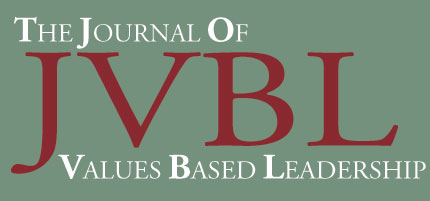- CONTENTS:
- Letter from the EditorTable of ContentsThe Amish: An Economy of ValuesCorporate Social Responsibility IS the Function of the CEO: A Portrait of the President of the Confederation of Indian IndustryWhole Foods Market: Idealism, Values, and a National Boycott Philanthropic Initiatives and the Value Proposition EquationPersonal Values and Commitment in Achieving Goals through the Cultural Organization of Work
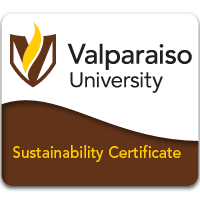
- CORPORATE SOCIAL RESPONSIBILITY IS THE FUNCTION OF THE CEO: A PORTRAIT OF THE PRESIDENT OF THE CONFEDERATION OF INDIAN INDUSTRY

SHASHANK SHAH, SRI SATHYA SAI UNIVERSITY (INTERVIEWER /AUTHOR),
DOCTORAL RESEARCH SCHOLAR, SCHOOL OF BUSINESS MANAGEMENT,
ANANTAPUR DISTRICT, ANDHRA PRADESH, INDIA
A. SUDHIR BHASKAR, SRI SATHYA SAI UNIVERSITY (INTERVIEWER/AUTHOR)
DEAN, SCHOOL OF BUSINESS MANAGEMENT
ANANTAPUR DISTRICT, ANDHRA PRADESH, INDIABackground
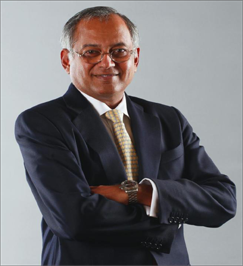
In March, 2009, Dr. Venu Srinivasan assumed the position of the President of the Confederation of Indian Industry and remitted the office in April, 2010. An accomplished industrialist from the century-old TVS family, Srinivasan was conferred with the prestigious Padma Shri Award by the Government of India in 2010 and the JRD Tata Corporate Leadership Award in 2004 by the All-India Management Association (AIMA). Srinivasan’s relentless commitment to quality in business operations also led to Sundaram Clayton Ltd. and TVS Motor Company Ltd. winning the global quality benchmark – the Deming Application Prize. Dr. Srinivasan is also credited with pioneering TQM (Total Quality Management) based on the Japanese model, long before most enterprises in India pursued same. He was designated “Star of Asia” by Business Week in 2003.
After excelling in engineering from Madras University, India, Mr. Srinivasan completed his MBA from Purdue University (USA) in 1977, and in 1979, began serving as the CEO of Sundaram Clayton Ltd, the parent company of TVS Motor Company. Currently, he is the Chairman and Managing Director of TVS Motor Company Ltd., a leading company in the 2-wheel automobile industry in India and ranked within the top five in this industry category throughout Asia.
Beginning with the manufacture of a simple, easy-to-use moped in India in the 1980s to launching seven new prototypes in a single day in 2009 (the first time this has been achieved in the history of the automotive industry in the world), TVS has excelled in personal transportation industry.
As stated on the Company website, TVS epitomizes Trust, Value and Service.
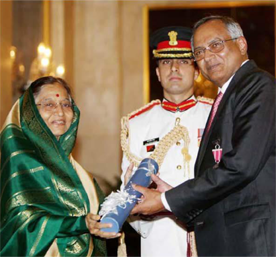
Dr. Venu Srinivasan receiving the Padma Shri Award from Her Excellency, the President of India, on April 7, 2010 at the Rashtrapati Bhavan, New Delhi
In this interview, Dr. Venu Srinivasan expresses his opinions on varied aspects of business and management including the purpose of business; the role of a business leader; and the obligations of business to society, the local community, and the natural environment. He also believes that in addition to the values espoused by the company leadership, such values must be shared by the company’s employees in accordance with the identified principles and objectives of the organisation. The frankness and straightforwardness of Dr. Venu Srinivasan is evident throughout the interview. He provides a number of examples and anecdotes of values-based leadership as demonstrated through the activities of his own organisation.
_______________________________________________________________________________________The Interview
Q. In your opinion, what is the basic purpose of business?
The basic purpose of business is to create wealth for all the stakeholders.
Q. Milton Friedman wrote in his book Capitalism and Freedom and I quote, “... few trends could so thoroughly undermine the foundations of our free society as the acceptance by corporate officials of a social responsibility other than to make as much money for their shareholders as possible.” What is your opinion on this?
Unfortunately, greed is considered as the fundamental value of capitalism. And I beg to disagree with Friedman’s observation. It is now well understood more in Europe and particularly more so in developing countries that social responsibility is a significant part of corporate goals and wealth creation. Wealth creation is not only for your shareholders, employees, and suppliers, but also for the society in which you are working. For example, safety and environmental concerns are very important from our industry’s point of view. These may not be very important in the short term. But in the long term, if you don’t follow them, society will pass rules. In our industry, Honda and Toyota have always believed in being ahead of society in terms of following the norms. Certain organisations have established themselves as role models in this regard. The Factories Act was based on the practices in the Tata factories. The Motor Vehicles Act was based on TVS bus transport rules. Ultimately, society follows those rules and catches up with such organisations. In the short term, these may not seem to pay the dividends.
I believe in creating value for my shareholders over the long term, even if it means some short-term sacrifices. How you establish the link with your shareholders is very important. Lower performance in the short run is always highlighted by analysts and the media and the CEO of an institution has to handle this pressure, as the image of the company and its management is important to maintain confidence in the company.
Q. Stakeholders management is becoming increasingly important for organisations. Do you feel your organisation is under such pressure?
It has been the fundamental philosophy of TVS to maintain trust with all the stakeholders. It goes back to the roots of the organisation to the founder’s values.
Q. Profit-making is essential for the success of any corporate organisation. Should profits be made at the cost of other aspects of the business? In your opinion, what are the factors which will have to be considered while planning for profits?
Maximising profit is like a linear programme. There are various constraints. You have the constraint of the customers’ welfare, supply chain’s welfare, shareholders’ welfare, employees’ welfare and society’s welfare. This defines the area in which you operate and within that you can maximise profit. But you have to operate within these constraints.
Q. For the industry of which your organisation is a part of, if one were to look at all the CEOs, what factors would you consider the that reflect their successful performance?
Four Critical Success Factors can be identified for the Automobile Industry:
- Quality – This is the primary factor for long-term success. Many times products come and disappear. That is because they have not met the customer’s satisfaction and requirements. On the other hand, some products have a long life in spite of change in fashion. These products have high quality and have won the trust of the customer. So quality is a very fundamental factor.
- Life-cycle cost – This includes initial cost plus usage cost. For example, someone may say, “I wouldn’t want to be seen on a TVS Star; I would rather be seen on a TVS Victor.” This is because Victor is considered to be an executive product while the Star is not. So though the parts and technical specifications are the same, the name and style are different. So there is a status attributable to a particular product. Style becomes a very critical part of customers’ aspirations and personality.
- Fashion – No customer today will buy a product which is not trendy and fashionable. Whatever the product or service that we offer to the consumer, we are appealing to his senses and this should always be kept in mind. So, fashion becomes an important parameter for the success of a product.
- Brand – The brand presents the values and benefits provided by a particular product. To maintain the brand integrity, this benefit must endure over the lifetime of the product and win the customer’s confidence and trust.
Q. What would be the characteristics/core values/organisation culture of an organisation with such a stakeholder focused approach?
The characteristics of an organisation with a stakeholder-focused approach would be:
- Human Resources – People come first in the company; actually even more than the customer. It is our people who serve customers by creating products and services that they need. Therefore, attracting, developing, and retaining people are some of the most important processes in a successful company. The cost spent on a human resources department should be considered as a significant investment in a business rather than an expenditure.Developing and maintaining a strong sense of loyalty to the company, to its goals and its values, are of utmost importance in retaining our valuable investment in our people. This can only be achieved by an organisation which treats its employees as critical stakeholders and partners in its business.
- Safety, Health, and Environment – Socially responsible companies have always understood that these aspects are crucial to the long-term survival of their organisations. Irresponsible extraction of natural resources, pollution of the environment, and providing unsafe products and services may appear profitable in the short term. However, there are innumerable examples of how such companies have ultimately suffered because of their myopic view and irresponsible behaviour. Good name (Shreyas) is far more important than fleeting fame (Keerti). My Guru, Sri Sathya Sai Baba, says, “It is great to be good, but not good to be great.” This is why saints and good kings leave their enduring footprints on the sands of time.
- Trust, Integrity, and Transparency – We need to have a high degree of trust and integrity to run our businesses successfully. To achieve this, there needs to be a great deal of transparency. We need transparency in our practices and behaviour so that people will come to trust us. Most of the “Built to Last” companies have adopted these values successfully.
"It is great to be good, but not good to be great."
- Sri Sathya Sai BabaQ. How can this culture continue in the face of changing leadership?
The role of leadership is to build an organisation that is capable of producing its own pipeline of leaders for the future. There is a famous book – Honda, Man, and Machine – which exemplifies the importance of building leaders. Mr. Honda and his partner decided that they would not allow their children into business. Therefore, with the goal to create an organisation which would continue to regenerate itself by creating leaders for the future, they built an institution which transcended the individuals to develop leadership skills. This is a very important lesson that we have to learn. It is the leader who should revel in grooming and nurturing successors who should achieve greater heights than him. The leader should not be like a banyan tree under which nothing grows. Finally, it is important for leaders to know when to fade away into the background.
Q. If an organisation wants to consciously implement this stakeholder-focused approach, certain critical processes are necessary. Could you mention them? What is your organisation doing in this regard?
- Lead by example – The leader should lead by his example. The most important point is that the leader lives by his acts and not by his words. There is a famous saying, “Your actions speak so loudly that I cannot hear what you say.” The first demand on the leader is that he should do as he says. It is very important for the leader to share the lores of that company. For example, “How did Mr. T.V. Sundaram Iyengar live? What were his values?” Passing and sharing this and inspiring others through this are very important. The only person who can tell stories is a leader because he has himself been a part of the company’s history. The role of a leader is that of a story- teller and a coach. In long-lived organisations, story-telling and reinforcing the values and culture of the organisation made them successful. For example, how do you take care of the society, the customers, the employees, the suppliers, and various examples supporting that? For example, when the Sikh riots took place (in 1984), my uncle who was the chairman of a company called IMPAL, immediately issued instructions that all Sikh dealers who had lost their property/shops must be given one month of parts on credit. Today, even the son of that dealer would know this story of the good done to them by IMPAL and would never leave the dealership of the organisation. Coaching, story-telling, and inculcating values are the most important processes in the organisation.
- Values across the organisation – This story-telling should cascade down to every level right to the grass roots.
- Values congruence – There must be commitment to the values and principles of the company. The assessment of this is very important. Assessment has to be not only on the performance of the employees but also on their commitment to the company’s values. If value congruence is not there, such employee should be encouraged to look for opportunities outside the company. So HR has a very critical role in appraisal in terms of values congruence. At TVS Motors, the family sports day, the founders’ day, the medical centre, the personnel manager, are all critical elements of the values congruence process. But one thing I have realized is that during potential appraisal, if a person does not have values congruence, you should not put him in positions of high authority even though the person may have high performance. Such high performance is not sustainable in the long term because at some point in time he will come into conflict with the organisation’s values and therefore leave the company.
- Maintaining trust with customers – Customer Relation Management is an important part of maintaining the value system of the company. Sales and marketing managers have to be appraised not only on their performance but also on the manner in which they have maintained trust with customers.
Q. Have you faced any difficulty in the implementation of the same? Can you share any incidents and/or personal experiences which you and your organisation faced or any challenges, ethical dilemmas, or crises when you and your organisation were at the crossroads for facilitating stakeholder welfare?
The first problem in implementing good CSM (Corporate Stakeholders Management) programmes is getting the involvement of all the good people in the company. Particularly, when you start a new business or new company and there are a large number of managers newly recruited from outside, getting the commitment to the values and principles is a challenge.
You may have very highly competent people who may not believe in the same values –particularly with regard to the corporate social programme – which in their mind does not have direct or immediate bearing on the company’s performance and results. I have personally faced these issues when starting a new business in new locations where we have had to recruit a number of people from outside. We made some painful separations and finally achieved an organisation which was congruent in values and committed to CSM.
Q. Do you have any success stories of stakeholder-focused management and decision-making which you have implemented?
We had mentioned success stories with regard to our Corporate Social Programmes. I can classify them into three categories:
- Programmes that have an immediate and direct connection with the business objectives;
- Those which have a relationship with the community surrounding the factories; and
- Those which have a broader impact on industry leaders and government and therefore help with the emerging brand of the company.
In these cases, I am not only talking about the company’s employees, dealers, and suppliers who are direct stakeholders, but all those who are generally considered more peripheral to the business. In areas where we undertake significant social development programmes, there has been a clear impact on improved sales of our product. In the areas surrounding our factory, the goodwill of villagers has helped us tackle many problems that normally arise in running business with the local community, employees, and the local political forces. As far as industry leaders and the government are concerned, our company has definitely benefited from the enormous amount of goodwill that our programmes have generated.
Q. Any ethical dilemmas?
Ethical dilemmas are always present in such programmes because of the lack of direct connection between business results and the corporate social programmes and therefore it is the responsibility of management to have a proper balance between the business and the stakeholders concerned.
To defend your company against actions which are Adharmic (unrighteous), would you resort to Adharmic (unrighteous) means? A Dharmic company has to go through all these difficulties before getting justice. It all comes back to bearing pain. One has to understand that this kind of dilemma exists in all businesses. It is very difficult to give an exact answer when we deal with such a situation. It is because every situation is unique and lot of Dharma (righteous conduct) has to be applied to every case uniquely. A good example is the Yaksha Prashna in Mahabharata (the great Indian epic).
The best solution my Guru gave to such a question is that “Pray to God and He will show you the right way.” Even though there are two alternatives – both appear to be bad. But through prayer, God shows you that one of them is not actually as bad as it appears to be.
Former American President Harry Truman once said, “If you cannot take the heat, better stay out of the kitchen.” Anyone who aspires to be the head of a business will have to accept dealing with these dilemmas as a part of his job.
Q. While adopting regulatory requirements (like Corporate Governance), what are the actual difficulties you face while implementing them in the true sense?
Meeting the law in letter and spirit is always a dilemma. Sometimes, you can meet the law in its letter but not in its spirit. These dilemmas always exist. Because you have Dharma (righteousness) as the basis of your actions, you have a dilemma. If you wouldn’t have had Dharma as the basis, you wouldn’t have had any dilemmas. In such a case, you would do what is expedient. The dilemmas always come when you want to be ethical. These dilemmas are always there and let me tell you from my personal experience that these are very difficult decisions to make. That’s why at the leadership position, you have so much stress and fatigue because you have to constantly face these dilemmas. But that’s what you are paid for and hence it becomes a part of your job.
Q. What is the criteria used at the time of evaluating R&D projects?
The environment is very critical today because you know that society is going to regulate you tighter and tighter. So a company that wants to survive in the long term will always have these as priorities. Honda decided to go to four-stroke much before Yamaha and Suzuki. Honda felt that in the interest of the society we must go for four-stroke because it is a more efficient process. Ultimately, there was much more response to Honda and it also became the largest motorcycle seller. Suzuki and Yamaha changed to four-stroke much later. The same applies to pollution within and outside your factory, safety in your factory, environmental degradation, etc. These become very critical parameters.
Q. India has had a spiritual culture and tradition for centuries. An analogy can be drawn between the kings of the yore and the corporate heads of today. It is a fact that the righteous kings of yore had “Praja Palan” – welfare of all his subjects as his primary goal/objective and not only of those who used to be regular taxpayers/providers of funds for the effective functioning of the kingdom. If we extrapolate the same to today’s times, one might rephrase this by saying that the duty of successful corporate organisations is to ensure the welfare of all its stakeholders and not only of those who provide funds to the organization for its effective functioning – the shareholders/providers of capital. If you agree with this, how do you feel corporate executives can implement this “Praja Palan?”
Corporate social responsibility is a function of the CEO.This is because ‘Yatha Raja, Tatha Praja’ (As is the king, so are the subjects). People take cues from what the leader does. Since the Corporate Social Responsibility benefits to a company derive over the long term, it’s really the CEO and his team that can understand the potential benefits and therefore make the necessary investment and commitments to the Corporate Social Responsibility programmes of the company.
Q. The Father of the Nation, Mahatma Gandhi, vehemently advocated the concept of trusteeship wherein every individual is a trustee or a custodian of the wealth he/she owns and the wealth has to be used to the extent possible for the welfare of all. This philosophy owes its origin to all major religions of the world – Hinduism, Jainism, Islam, Christianity, Sikhism, etc. What is your opinion on this?
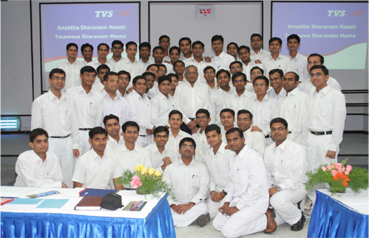
Sri Sathya Sai University Management Students with Dr. Srinivasan in April 2010 at the TVS Motor Factory, Hosur, India
In our family we have always been told that you are not owners but trustees. The family was also a great supporter of the Indian Independence movement. So we have always had the affinity to the Gandhian approach to the society and my grandfather was also a very simple man, much simpler than the businessmen of his times. My grandfather was the reason for this approach of trusteeship in our family and it has passed on from generation to generation. By and large our family believes in this concept of trusteeship.
_____________________________________________________________________________
Interviewer/Author Information
Shashank Shah is a doctoral research scholar at the School of Business Management, Sri Sathya Sai University, Prashanti Nilayam, Andhra Pradesh, India. He has been awarded highest honors for academic excellence in the university’s Masters of Business Administration and Masters of Philosophy in Business Management programmes and is currently pursuing his Ph.D. in Corporate Stakeholders Management. He has published over twenty-two research-based papers in national and international journals and has presented six research-based papers in international conferences in the areas of corporate governance, corporate social responsibility and corporate stakeholders management. Additionally, he has co-authored two books in similar areas. He can be contacted by mail at the School of Business Management, Sri Sathya Sai University, Vidyagiri, Prashanti Nilayam – 515134, Anantapur District, Andhra Pradesh, India, by telephone 09441034682, or by email at shashank@sssu.edu.in.
A. Sudhir Bhaskar is Dean and Professor, School of Business Management, Sri Sathya Sai University, Prashanti Nilayam, Andhra Pradesh, India. He completed his M. Tech from Indian Institute of Technology, Madras, India and is a Fellow of Indian Institute of Management, Bangalore, India. As Management Consultant, Tata Consultancy Services, India, he has undertaken a large number of organisation-based consultancy projects in the area of complex problem solving and solution implementation. He has published over half a dozen articles and presented 3 research-based papers in international conferences. He can be contacted by mail at the School of Business Management, Sri Sathya Sai University, Vidyagiri, Prashanti Nilayam – 515134, Anantapur District, Andhra Pradesh, India, by telephone 09440287559, or by email at sudhirbhaskar@sssu.edu.in.
DEDICATION
The authors humbly dedicate this endeavour to the Revered Chancellor, Sri Sathya Sai University – Bhagavan Sri Sathya Sai Baba.
